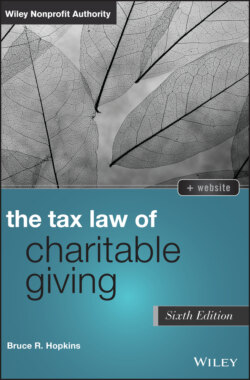Читать книгу The Tax Law of Charitable Giving - Bruce Hopkins R., Bruce R. Hopkins, David Middlebrook - Страница 15
§ 1.3 CHARITABLE ORGANIZATIONS LAW PHILOSOPHY
ОглавлениеThe definition in the law of the term nonprofit organization and the concept of the nonprofit sector as critical to the creation and functioning of a civil society do not distinguish nonprofit organizations that are tax-exempt from those that are not. This is because the tax aspect of nonprofit organizations is not relevant to either subject. Indeed, rather than defining either the term nonprofit organization or its societal role, the federal tax law principles respecting tax exemption of these entities reflect and flow out of the essence of these subjects.
This is somewhat unusual; most tax laws are based on some form of rationale that is inherent in tax policy. The law of charitable and other tax-exempt organizations, however, has very little to do with any underlying tax policy. Rather, this aspect of the tax law is grounded in a body of thought quite distant from tax policy: political philosophy as to the proper construct of a democratic society.
This raises, then, the matter of the rationale for tax-exemption eligibility of nonprofit organizations. That is, what is the fundamental characteristic—or characteristics—that enables a nonprofit organization to qualify as a tax-exempt organization? In fact, there is no single qualifying feature. This circumstance mirrors the fact that the present-day statutory tax exemption rules are not the product of a carefully formulated plan. Rather, they are a hodgepodge of federal statutory law that has evolved over nearly 100 years, as various Congresses have deleted from (infrequently) and added to (frequently) the roster of exempt entities, causing it to grow substantially over the decades. As one observer wrote, the various categories of tax-exempt organizations “are not the result of any planned legislative scheme” but were enacted over the decades “by a variety of legislators for a variety of reasons.”16
There are six basic rationales underlying qualification for tax-exempt status for nonprofit organizations. On a simplistic plane, a nonprofit entity is tax-exempt because Congress wrote a provision in the Internal Revenue Code according tax exemption to it. Thus, some organizations are tax-exempt for no more engaging reason than that Congress said so. Certainly, as to this type of exemption, there is no grand philosophical principle buttressing the exemption.
Some of the federal income tax exemptions were enacted in the spirit of being merely declaratory of, or furthering, then-existing law. The House Committee on Ways and Means, in legislating a forerunner to the provision that exempts certain voluntary employees' beneficiary associations, commented that “these associations are common today [1928] and it appears desirable to provide specifically for their exemption from ordinary corporation tax.”17 The exemption for nonprofit cemetery companies was enacted to parallel then-existing state and local property tax exemptions.18 The exemption for farmers' cooperatives has been characterized as part of the federal government's posture of supporting agriculture.19 The provision exempting certain U.S. corporate instrumentalities from tax was deemed declaratory of the exemption simultaneously provided by the particular enabling statute.20 The provision according tax exemption to multiparent title-holding corporations was derived from the refusal of the Internal Revenue Service (IRS) to recognize exempt status for title-holding corporations serving more than one unrelated parent entity.
Tax exemption for categories of nonprofit organizations can arise as a by-product of enactment of other legislation. In these instances, tax exemption is granted to facilitate accomplishment of the purpose of another legislative end. Thus, tax-exempt status has been approved for funds underlying employee benefit programs. Other examples include tax exemption for professional football leagues that emanated out of the merger of the National Football League and the American Football League, and for state-sponsored providers of health care to the needy, which was required to accommodate the goals of Congress in creating health care delivery legislation.
There is a pure tax rationale for some tax-exempt organizations. Social clubs stand out as an illustration of this category.
The fourth rationale for tax-exempt status is a policy one—not tax policy, but policy with regard to less essential elements of the structure of a civil society. This is why, for example, tax-exempt status has been granted to entities as diverse as fraternal organizations, title-holding companies, farmers' cooperatives, certain insurance companies, and prepaid tuition plans.
The fifth rationale for tax-exempt status rests solidly on a philosophical principle. Yet, there are degrees of scale here; some principles are less majestic than others. Thus, there are nonprofit organizations that are tax-exempt because their objectives are of direct importance to a significant segment of society and indirectly of consequence to all of society. Within this frame lies the rationale for tax exemption for entities such as labor organizations, trade and business associations, and veterans' organizations.
The sixth rationale for tax-exempt status for nonprofit organizations is predicated on the view that exemption is required to facilitate achievement of an end of significance to the entirety of society. Most organizations that are generally thought of as charitable in nature21 are entities that are meaningful to the structure and functioning of society in the United States. At least to some degree, this rationale embraces social welfare organizations. This rationale may be termed the public policy rationale.22
